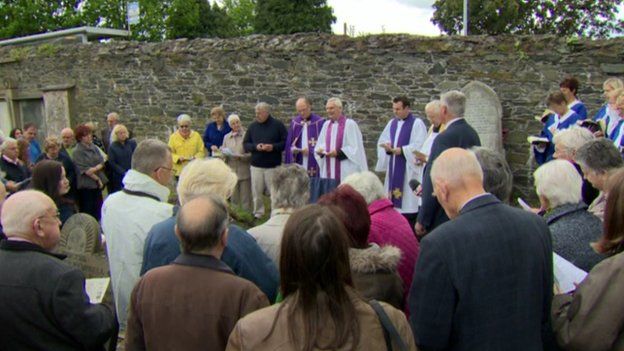Bangor Abbey holds funeral service for human remains found after 800 years
- Published

The funeral service was held in the grounds of Bangor Abbey on Saturday afternoon
A funeral service has taken place for 20 people at Bangor Abbey in County Down, almost 800 years after they died.
The remains of the 10 men, seven women and three children were discovered in 2011, during renovation work in the abbey grounds.
They were found near St Malachy's Wall, the last standing part of the former medieval monastery.
Speaking to the County Down Spectator, external newspaper, Canon Ronnie Nesbitt said there was a bit of mystery surrounding the remains.
"They were found inside the monastery and certainly the women and children couldn't have been monks.
"So there's a bit of a puzzle over why they would have been buried within what was an operational ecclesiastical building."
The 800-year-old human remains of 20 people were reburied in the grounds of Bangor Abbey
The reburial service was open to the public
Archaeologists have said the group may have come from a rural farming community and there was evidence of wear, tear and injury caused by physical work.
The 20 people died from natural causes and had Christian burials.
On Saturday, they were reburied in a modern funeral service and their resting place is to be marked with a newly-commissioned headstone.
The service was open to the public, with the organisers hoping to attract people with an interest in local history.
"I've been trying to imagine the lives of these people," said Canon Nesbitt.
"What comes across is a sense of peril, of hardness, of how much they truly were at the mercy of the elements and I suspect their understanding of God would have been much more central to their lives."
An exhibition with more information on the remains is running at the North Down Museum.
Bangor Abbey was founded in 558 AD by Saint Comgall